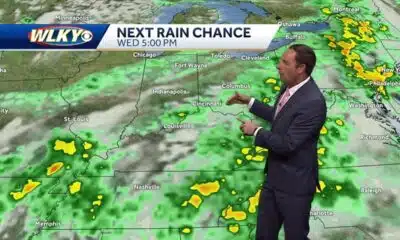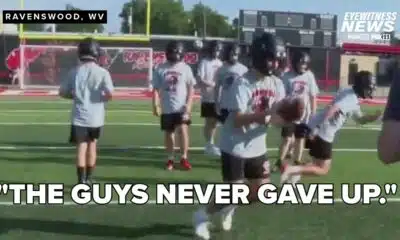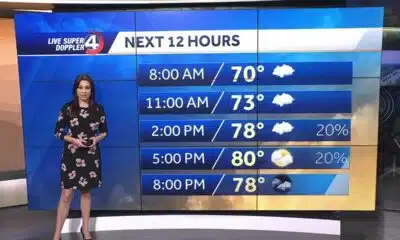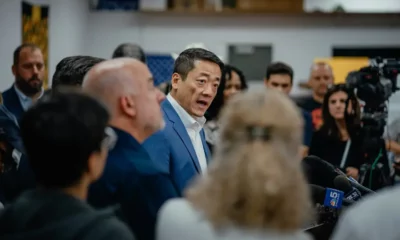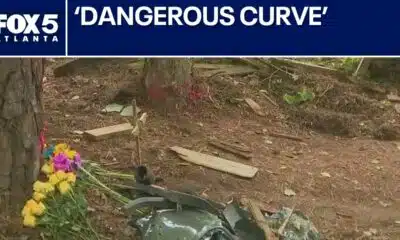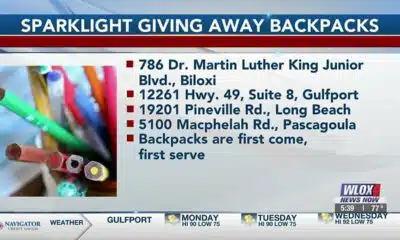News from the South - Kentucky News Feed
A conversation with Dr. Steven Stack, Kentucky’s new health cabinet secretary
by Sarah Ladd, Kentucky Lantern
June 23, 2025
FRANKFORT — Dr. Steven Stack says Kentucky, which already struggles with poor health, is “on the cusp of having a significant backslide” if the federal government cuts programs like Medicaid and SNAP.
Stack, who on July 1 will shift roles from the state’s public health commissioner to the secretary of the Cabinet for Health and Family Services, said Kentucky can become a healthier state over time, but that requires robust safety net programs.
The “profound cuts” proposed to Medicaid by Republicans in Congress, he said, would push vulnerable people from “the edge of despair … into despair.”
He’s also concerned that science is becoming less trusted and prioritized as the Trump administration cuts funding for research and widespread vaccine hesitancy has led to drops in childhood immunizations.
In his new role, Stack will oversee a state agency that employs about 8,000 people and wields a multi-billion dollar budget. The cabinet manages Kentucky’s human services, which includes Medicaid, foster care, care for the aging, assistance for those with disabilities and more.
Stack will bring to the secretary position a 20-year medical career, according to his official state biography. Born in Cleveland, Ohio, Stack has been an adjunct professor at the University of Tennessee Haslam College of Business, served on the American Medical Association (AMA) board of trustees and worked as the medical director for St. Joseph East in Lexington, St. Joseph in Mt. Sterling and Baptist Memorial Hospital in Memphis.
Stack is replacing Eric Friedlander, who is retiring. Dr. John Langefeld will replace Stack as the public health commissioner.
Ahead of his transition, Stack sat down with the Kentucky Lantern in his Frankfort office for a 40-minute conversation about lessons learned from the COVID-19 pandemic, the politics of health, the direction the United States is heading — and what that could mean for Kentucky’s health infrastructure — and more. The conversation has been edited for length and clarity.
Kentucky Lantern: Let’s start with the pandemic. What did you learn during COVID that you’re going to take into this new role?
Dr. Steven Stack: One of the things that I was grateful for was my background as an ER doc. In the emergency department, you have to make fast paced decisions in an information-poor environment, and you have to live with the consequences. I think that described COVID to a tee. We did that on a weekly, if not a daily, basis. We made high stakes decisions, and we had to do the best we could, and you had to communicate clearly what you were doing and why, and you had to own the consequences of those decisions.
I don’t think it was the first time I learned the lesson, but I think that it made it very clear: Leadership is a privilege and an honor. The other thing is: You learn that leadership can be lonely and it extracts a price, and so whenever you have to make decisions, there are some people who like the decisions and there are other people who don’t.
COVID, being a once in a century pandemic, was of a scale and a magnitude that obviously changed all of our lives for an extended period of time, and I think gave me a much deeper, much richer appreciation for both the opportunity and the burden of leadership and the responsibility that is attendant to it.
KL: How did you avoid burnout?
SS: I’m not sure I fully did. Burnout has a number of different elements, at least as I understand it. One is, did I avoid physical exhaustion? No, I didn’t.
It was the first job I’ve ever had that was so hard for such an intensive period or a prolonged period of time that that caused me health impact. And so I don’t think I avoided the physical exhaustion; that facet of burnout, but I don’t think I got emotionally burnt out, and I don’t think I got mentally burnt out.
It was important work in a time of crisis, and there was a lot of uncertainty, and a lot of people who were in need of someone to at least message clearly and reassuringly that while it would be difficult, we would get through it.
KL: What did you do for your mental health — then and also now — to help with this stress?
SS: When I’m doing my best, I get up early in the morning, and I like to read books. I read history books to provide perspective. I do that because, in any moment in time, there are crises.
Yesterday was full of multiple crises: a large jumbo jet crashing with one survivor, a new escalation in Middle East tensions. There’s certainly controversy related to protests occurring and the use of the federal government using state resources to play a role in that. So there are always crises.
I find it helps to read history a little bit and put in context that there have been crises before. There have been plenty of existential moments where the leaders of the time and the people felt ‘we’re at the precipice. It’s not clear that we won’t go over the precipice.’
That’s one of the things I tried to do during COVID, was to acknowledge the difficulty of the time. I had confidence during COVID we would get through it, and we would get through it together, just like the governor said, because that’s what has always happened in history. But getting through it didn’t mean that there wouldn’t be people lost along the way, and there wouldn’t be traumas and sorrows to accept and deal with.
KL: Health has become more and more political. We saw it during the COVID-19 lockdowns and when the vaccines came out. We’re seeing it now. How do we remove politics from health? Or — should we?
SS: Everything’s politics. Politics is negotiating with your 3-year-old at home, whether they’re going to use the potty or not. Or it is negotiating with your teenager whether they can have access to the car or not to go out for the weekend.
Politics determines our food sources. It determines what gets approved or supported for the foods we buy at the grocery store or how farmers are or are not supported. It certainly impacts the medications that we have access to or not.
In the current situation, it raises real concerns about our politics reaching the point where science is taking a back seat to prove people’s personal preferences. I think that that’s very dangerous because while we’re always going to have different perspectives on different topics, it’s really essential that we try to adhere to some kind of structured approach, and ideally a transparent approach, to how decisions are made.
Right now, we have a real challenge, because there’s an intense blurring of a magnitude we really haven’t experienced in recent years of science versus preference and beliefs. I am concerned that if we don’t find a way to kind of back that down a bit, that the public won’t have access to the very best choices, the very best options that they could have.
KL: Robert F. Kennedy Jr. just fired the vaccine advisory board and has promoted information that’s not backed by science since taking over as U.S. Health and Human Services secretary. As you enter this new role, how can you lead with science if the federal guidelines aren’t based on science?
SS: It gets difficult because we have long relied on federal institutions to be the aggregator across the states.
There’s only one entity in the United States that can approve new pharmaceuticals. It’s the Food and Drug Administration. No state has the authority to approve a new pharmaceutical for marketing.
As a nation, we’ve got to find a way to lower the temperature on some of these things, and we also have to remind ourselves that a big part of our democracy is that we support all persons to have their opinion and to have their voice, and that while the majority gets the opportunity to make the decisions, there’s always an obligation to ensure the minority’s voice can be heard, can be safely expressed, and can have the opportunity to be persuasive, which requires the majority to be open to persuasion. Right now, we really don’t have that.
KL: These controversies aren’t just at the federal level. What about your cabinet’s relationship with the legislature? How will you approach the conversations around kinship care and foster kids sleeping in offices, for example?
SS: I intend to do what I’ve done, I hope, up to this point: to be candid, to be honest, to be forthright about what I understand to be occurring and what I recommend should occur.
Anyone who gets elected to a position has to be able to show to the people who elected them that they are advocating for and fighting for what those people want. So what happens at a legislative hearing — people need to look past the intensity of the moment and the words that are said.
Even in these hyper political times, there is a lot of collaborative work that gets done behind the scenes, because, believe it or not, even if the legislature doesn’t like what the executive branch does, the legislature needs the executive branch to implement the things it wants to be done. So, if they create circumstances where it becomes impossible for the executive branch to actually do their work, it doesn’t just mean that the other party’s work doesn’t get done. It means that their work doesn’t get done.
At the end of the day, government needs to come together in some form or fashion to make sure that the things that the legislature wants done have an executive branch resourced properly and capable of doing those things. It doesn’t always happen that way.
KL: Zooming out for a second, Kentucky has high rates of opioid use disorder, cancer — so many issues. Is it possible for Kentucky to ever be a healthy state? And if so, how could we get there?
SS: I think it’s possible for Kentucky to be a healthier state.
There’s a ranking system — America’s Health Rankings — that comes out every year. Over the last five to seven years, Kentucky has gone from 47th to 41st. I give a lot of credit to the intentional expansion of Medicaid and the running of the state-based (health insurance) exchange, because while health insurance does not guarantee health — they’re not the same thing — not having access to health care causes people to live sicker and die younger.
We have other headwinds that are really challenging. Kentucky is one of the poorest states in the United States. We have areas that face particularly difficult challenges. So the Appalachian region has a number of challenges. They have the loss of the coal industry, which increased unemployment and decreased employment opportunities. With these floods that have happened with climate change, they’ve been devastated multiple times because they don’t live in a flat area. They live in an area where you build in the valley, because that’s the only place there’s flat land. But then when the water comes, it floods out everywhere you are.
KY still pays price for one of nation’s highest rates of opioid use disorder, says new report
Addiction is often a consequence, a disease of despair and a disease of despondency. And so when people don’t have jobs and they struggle to support themselves, they look for an outlet, and so often those drugs become part of that outlet. We have to address those fundamental things.
In this administration, the governor frequently talks about economic development and talks about bringing in new employers. The way we get people off Medicaid, the way we get people to be more self sufficient and more resilient, not entirely, but in a large part is: Do we have well paying jobs where people can go earn a good living and then bring health insurance with it, so that they can have access to health care and support themselves and have productive lives? If we don’t focus on creating communities that are livable with job opportunities that bring health insurance with them, it’s very, very difficult.
Right now, there are profound cuts proposed to the SNAP program, significant cuts in different ways for the Medicaid program. Those things are going to take the most vulnerable among us and take them from being at the edge of despair, and thrust them into despair.
I’m very concerned that the path we appear to be on is going to take a state like Kentucky that relies very heavily on those services and supports and thrust a large portion of Kentuckians into a very, very difficult and stressful position, which is going to be a massive headwind against improving our health outcomes.
KL: To close us out, what are your main goals for your tenure as cabinet secretary?
SS: When I step in on July 1, I’m going to have two years and five months (until the end of the Beshear administration), pretty much, and it’s going to be during a time of major federal retraction in the support that it provides.
My goals are to support the governor’s initiatives, to try to make sure that, through the end of this administration, we continue to deliver on his commitments to the people of Kentucky.
My goal would be to support the people of Kentucky, to make sure they have the best that we can provide them with the resources available, to make sure they don’t go hungry, to make sure their kids show up ready for school. So (Beshear has) a push now for pre-K. It’s really, really important in those early years that children are resourced properly, that they don’t go to school hungry, and that they have access to structured environments that can educate and help form them and set them on a good path.
A big part of my task is, how can I lead the team here, the team that I inherit, to perform at the very highest possible level, so that whatever the resources we have, we maximize those to the greatest good for as many people as we can serve. If we lose a lot of federal dollars, the reality is we won’t be able to provide the same amount of services. That’s the truth.
If the federal government ships major costs to the state, the legislature is going to have some really hard choices. If the elected representatives of the United States House and Senate decide to cut money from the state, their counterparts at the statehouse are then going to be left with the decision: What do we pay for and what don’t we and what services will the people of Kentucky not get?
In this case, the legislative branch, both federally and state, will ultimately be the ones who make those decisions and own the consequences. They have difficult choices to make, but those choices will have real consequences.
GET THE MORNING HEADLINES.
Kentucky Lantern is part of States Newsroom, a nonprofit news network supported by grants and a coalition of donors as a 501c(3) public charity. Kentucky Lantern maintains editorial independence. Contact Editor Jamie Lucke for questions: info@kentuckylantern.com.
The post A conversation with Dr. Steven Stack, Kentucky’s new health cabinet secretary appeared first on kentuckylantern.com
Note: The following A.I. based commentary is not part of the original article, reproduced above, but is offered in the hopes that it will promote greater media literacy and critical thinking, by making any potential bias more visible to the reader –Staff Editor.
Political Bias Rating: Center-Left
This article primarily presents Dr. Steven Stack’s perspective as a public health official concerned about proposed federal cuts to Medicaid and SNAP, emphasizing the potential negative effects on vulnerable populations in Kentucky. The tone is sympathetic to robust social safety nets and the role of science-based policy, while criticizing aspects of the Trump administration’s approach to research funding and vaccine policy. Although it is largely factual and quotes Stack extensively, the framing aligns more with a center-left viewpoint that supports expanded government health programs and expresses concern over conservative budget reductions and politicization of science. The piece avoids partisan attacks but clearly highlights progressive concerns about social welfare and public health.
News from the South - Kentucky News Feed
A presentation on the Mint Lane pump station
SUMMARY: On August 12th, Water Quality Director Charlie Martin will present proposed improvements to the Mint Lane pump station at the Environmental Quality and Public Works Committee meeting. The pump station, serving west Lexington’s Beaumont area, moves storm and sewer water to treatment plants. Since 2015, it has experienced 28 overflows, leaking 12.9 million gallons of untreated sewage. Improvements are required by Lexington’s EPA Consent Decree, stemming from a 2006 lawsuit over sewer system violations, mandating $590 million in repairs by 2030. Relocation was considered but deemed inefficient; a new station design is proposed by 2026, with construction in 2027-2028. Public engagement is encouraged.
The post A presentation on the Mint Lane pump station appeared first on lexingtonky.news
News from the South - Kentucky News Feed
Staying hot with rain chances returning this week
SUMMARY: The weather remains hot, with temperatures reaching the lower 90s and some isolated showers recently developing. Better rain chances return midweek, especially Wednesday, which is expected to bring scattered thunderstorms, heavy downpours, and gusty winds due to a trough moving in from the northwest. Tuesday may see a stray shower as moisture increases, but mostly dry conditions will last through early week. After Wednesday and Thursday showers, heat will return, with temperatures in the lower 90s by the weekend. The Kentucky State Fair is forecasted to be hot and mostly dry, but locals are advised to stay hydrated amid the persistent heat and humidity.
WLKY meteorologist Eric Zernich’s Sunday evening forecast
Subscribe to WLKY on YouTube now for more: http://bit.ly/1e5KyMO
Get more Louisville news: http://www.wlky.com
Like us: http://www.facebook.com/wlkynews
Follow us: http://twitter.com/WLKY
Instagram: https://www.instagram.com/wlky/
News from the South - Kentucky News Feed
What could a street art program look like in Lexington?
SUMMARY: On August 12th, Principal Planner Hannah Crepps will present plans for a new street art program in Lexington at the Environmental Quality and Public Works Committee meeting. The program aims to formalize street art projects, which many U.S. cities use to calm traffic and reduce crashes by incorporating painted crosswalks and road designs. Lexington will draft guidelines including funding sources, community decision-making, and traffic safety compliance. A pilot chalk art project was tested in May 2025 on Shropshire Avenue. Residents can engage with the program by contacting Crepps and watching the live meeting online or in person.
The post What could a street art program look like in Lexington? appeared first on lexingtonky.news
-
Mississippi Today6 days ago
After 30 years in prison, Mississippi woman dies from cancer she says was preventable
-
News from the South - Texas News Feed6 days ago
Texas redistricting: What to know about Dems’ quorum break
-
News from the South - North Carolina News Feed4 days ago
Two people unaccounted for in Spring Lake after flash flooding
-
Mississippi Today6 days ago
Brain drain: Mother understands her daughters’ decisions to leave Mississippi
-
News from the South - Louisiana News Feed7 days ago
Plans for Northside library up for first vote – The Current
-
News from the South - Texas News Feed7 days ago
Pritzker says Texas Democrats who fled state will be protected amid arrest threats
-
News from the South - Georgia News Feed6 days ago
29-year-old killed after driving off road in 'dangerous' section road | FOX 5 News
-
Local News Video7 days ago
Sparklight offers free backpacks and school supplies to Coast kids





